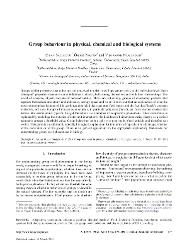Group behaviour in physical chemical and biological systems
Abstract
Groups exhibit properties that either are not perceived to exist or perhaps cannot exist at the individual level. Such 'emergent' properties depend on how individuals interact both among themselves and with their surroundings. The world of everyday objects consists of material entities. These are ultimately groups of elementary particles that organize themselves into atoms and molecules occupy space and so on. It turns out that an explanation of even the most commonplace features of this world requires relativistic quantum field theory and the fact that Planck's constant is discrete not zero. Groups of molecules in solution in particular polymers ('sols') can form viscous clusters that behave like elastic solids ('gels'). Sol-gel transitions are examples of cooperative phenomena. Their occurrence is explained by modelling the statistics of inter-unit interactions: the likelihood of either state varies sharply as a critical parameter crosses a threshold value. Group behaviour among cells or organisms is often heritable and therefore can evolve. This permits an additional typically biological explanation for it in terms of reproductive advantage whether of the individual or of the group. There is no general agreement on the appropriate explanatory framework for understanding group-level phenomena in biology.
















